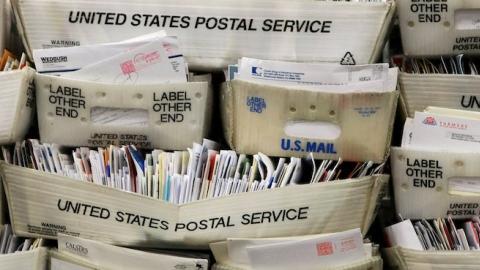Today a U.S. government agency will make a momentous decision for our economy and our national security, even though it’s an agency most Americans know nothing about: the Postal Regulatory Commission. It is slated to determine whether the new proposed rules of the Universal Postal Union, or UPU, the U.N. agency that oversees international postal package deliveries, are consistent with the mission of the U.S. Postal Service.
How the commission decides will go a long way in either making us all safer and more secure — or in enabling terrorists, drug dealers, and Chinese e-commerce companies to continue to have a free hand in abusing, at our expense, the international postal-package system.
To understand what’s going on, it’s important to note first of all that these proposed new rules are actually the old rules with some minor cosmetic changes meant to mollify a growing chorus of critics. Those rules govern the rates that a country’s postal service, including ours, is allowed to charge foreign posts for the delivery of packages that those foreign posts send to customers inside that country, including the United States. Under current rules, those charges (called terminal dues) are set ludicrously low for certain countries, among them China. (Under UPU rules, for example, China, the world’s second-largest economy, gets the same break on terminal dues as do Gabon and Botswana.) This means that the USPS actually charges China Post less to deliver a package from China into the U.S. than it charges a U.S. business or customer to deliver a similar size package within the 48 states. The post office is losing money on every package it delivers from China — costs it has to pass on to its own American customers, not to mention U.S. taxpayers.
Under the UPU’s bizarre system, our postal service is subsidizing e-commerce companies in China and Singapore, for example, at the expense of U.S. taxpayers. They and U.S. postal customers end up having to pay the difference between what it costs to deliver the package from China and what China Post pays the USPS.
Even worse, those same rules compel the USPS to act as the mule for international drug traffickers. Under UPU rules, our post has office to deliver all packages from foreign sources even if they have not passed any customs inspection, and even if the post office has no information about what the package contains or whence it originated. As the traffic in international postal packages has exploded in the past decade, thanks to e-commerce, so too has the ability of drug traffickers to flood the U.S. and the world’s postal systems with packages containing flakka, fentanyl, and other drugs — again, with much of it coming out of China.
It’s not just the world’s drug dealers who are learning how to use to their advantage the UPU’s negligence regarding these dangers. The world’s terrorists are going to be next.
In fact, they already have. In October 2010, explosives were discovered in a package being shipped by UPS from Yemen to Chicago via London — explosives addressed to Chicago synagogues. UPS has an electronic tracking system for all its packages, making it possible for British intelligence to intercept the bombs. Virtually no government postal service besides our own has such a tracking system, certainly not for overseas packages. If those bombs had been carried by a foreign post instead of a private carrier, there would have been almost no chance that the package have been found on time.
If the UPU doesn’t care whether its rules pose a direct threat to the U.S., not to mention other countries, the Postal Regulatory Commission should. It should rule that the UPU status quo isn’t consistent with what the USPS should have as its mission, both in terms of postal rates and preserving our economy, our health, and our national security.
Such a ruling will no doubt set off a firestorm, not only at the UPU congress that meets in Istanbul next month but also within the U.S. State Department, which has until now largely turned a blind eye to the dangers inherent in the international parcel-post system, for fear of breaking some diplomatic crockery. Maybe it’s time for the Postal Regulatory Commission to break the crockery from China.



















